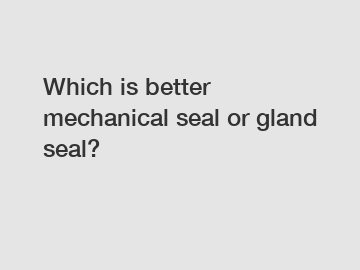Which is better mechanical seal or gland seal?
Which is better, mechanical seal or gland seal?
When it comes to sealing fluid in pumps and other machinery, mechanical seals and gland seals are two common options. Both types aim to prevent leaks and ensure smooth operations, but which one is better? In this article, we will explore various aspects of mechanical seals and gland seals to determine their strengths and weaknesses, allowing you to make an informed decision based on your specific needs.
1. Definition and Function:

Firstly, let's clarify the difference between mechanical seals and gland seals. A mechanical seal is a device that creates a dynamic seal between the rotating shaft and the pump housing, while a gland seal, also known as a packing seal, relies on compressed packing material to seal the shaft. Both seals serve the same purpose of preventing leaks in pumps, but they do so using different mechanisms.
2. Leakage Control:
One of the crucial factors in determining the effectiveness of a seal is leakage control. Mechanical seals, with their face-to-face design, provide excellent sealing against leaks. The sealing surfaces are often made of materials like silicon carbide, tungsten carbide, or ceramics, which are highly resistant to wear and corrosion. On the other hand, gland seals tend to allow minimal leakage. The packing material needs to be adequately compressed, but there is always some degree of leakage due to the nature of the design.
3. Reliability and Maintenance:
In terms of reliability, mechanical seals have proven to be more reliable in many industries. They provide a more robust and secure seal, reducing the risk of leakage and downtime. However, mechanical seals require precise installation and regular maintenance to ensure optimal performance. Gland seals, while simpler in design, may require more frequent maintenance due to the gradual wear and deterioration of the packing material.
4. Temperature and Pressure Resistance:
When it comes to handling extreme temperatures and pressures, mechanical seals usually outperform gland seals. Mechanical seals can withstand higher pressures and a wider range of temperatures, making them suitable for demanding applications such as chemical processing or power generation. Gland seals, on the other hand, have limitations in terms of pressure and temperature capabilities. They are typically employed in applications with lower pressures and temperatures.
5. Cost Considerations:
Cost is an important factor to consider when choosing between mechanical seals and gland seals. Mechanical seals tend to have a higher upfront cost due to their complex design and use of advanced materials. However, over time, they often prove to be more cost-effective as they require less maintenance and reduce the risk of leaks. Gland seals have a lower initial cost but may involve higher long-term costs due to frequent replacements and ongoing maintenance requirements.
Conclusion:
In conclusion, the choice between mechanical seals and gland seals depends on several factors, including leakage control, reliability, maintenance, temperature and pressure resistance, as well as cost considerations. Mechanical seals offer superior leakage control and reliability, making them ideal for critical applications with high pressures and temperatures. Despite their higher upfront cost, mechanical seals tend to be more cost-effective in the long run. On the other hand, gland seals may be suitable for low-pressure and temperature applications, especially when cost is a significant consideration and maintenance resources are readily available.
Ultimately, the decision between mechanical seals and gland seals should be based on the specific requirements and budget of your application. Consider consulting with experts or manufacturers to determine the best seal type that meets your needs and ensures optimal performance and longevity for your equipment.
For more information, please visit catalog oil seal, quality rubber oil seal, nbr rubber parts for sealing manufacturers china.


